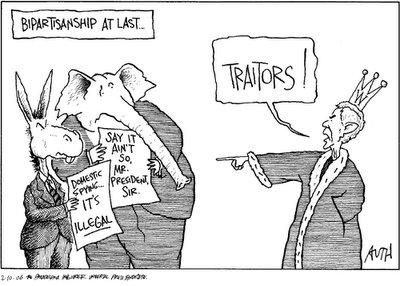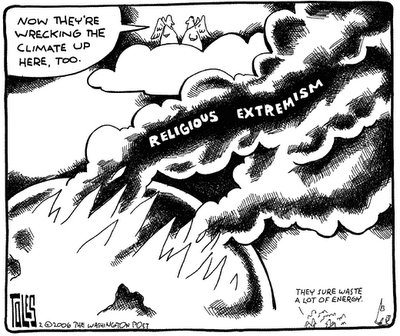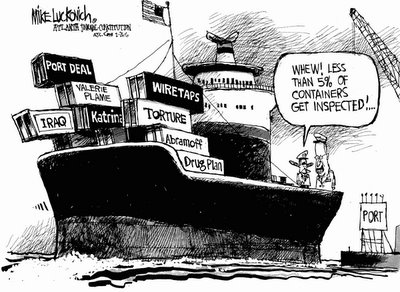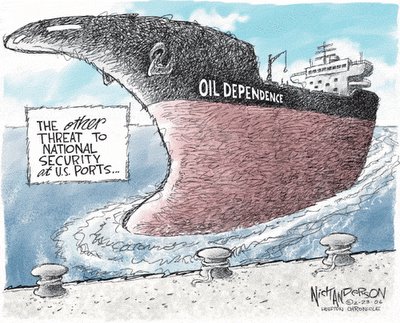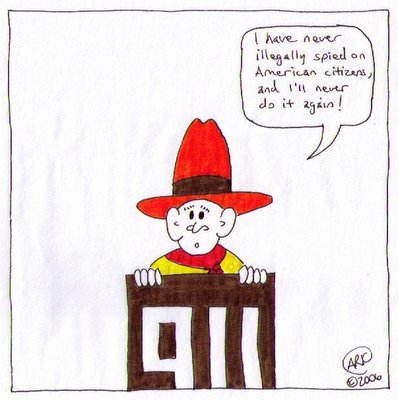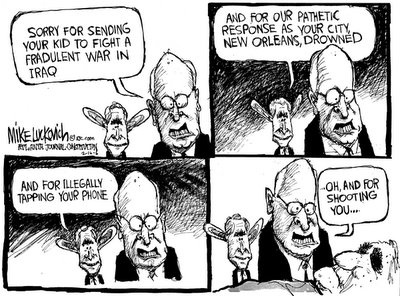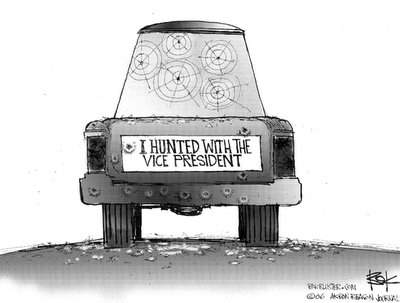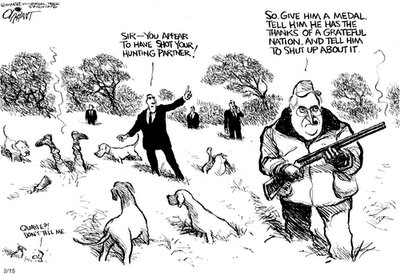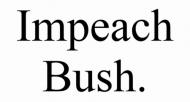By Nat Parry from Consortium News

Not that George W. Bush needs much encouragement, but Sen. Lindsey Graham suggested to Attorney General Alberto Gonzales a new target for the administration's domestic operations - Fifth Columnists, supposedly disloyal Americans who sympathize and collaborate with the enemy.
"The administration has not only the right, but the duty, in my opinion, to pursue Fifth Column movements," Graham, R-S.C., told Gonzales during Senate Judiciary Committee hearings on Feb. 6.
"I stand by this President's ability, inherent to being Commander in Chief, to find out about Fifth Column movements, and I don't think you need a warrant to do that," Graham added, volunteering to work with the administration to draft guidelines for how best to neutralize this alleged threat.
"Senator," a smiling Gonzales responded, "the President already said we'd be happy to listen to your ideas."
In less paranoid times, Graham's comments might be viewed by many Americans as a Republican trying to have it both ways - ingratiating himself to an administration of his own party while seeking some credit from Washington centrists for suggesting Congress should have at least a tiny say in how Bush runs the War on Terror.
But recent developments suggest that the Bush administration may already be contemplating what to do with Americans who are deemed insufficiently loyal or who disseminate information that may be considered helpful to the enemy.
Top US officials have cited the need to challenge news that undercuts Bush's actions as a key front in defeating the terrorists, who are aided by "news informers" in the words of Defense Secretary Donald Rumsfeld.
Detention Centers Plus, there was that curious development in January when the Army Corps of Engineers awarded Halliburton subsidiary Kellogg Brown & Root a $385 million contract to construct detention centers somewhere in the United States, to deal with "an emergency influx of immigrants into the US, or to support the rapid development of new programs," KBR said. [Market Watch, Jan. 26, 2006]
Later, the New York Times reported that "KBR would build the centers for the Homeland Security Department for an unexpected influx of immigrants, to house people in the event of a natural disaster or for new programs that require additional detention space." [Feb. 4, 2006]
Like most news stories on the KBR contract, the Times focused on concerns about Halliburton's reputation for bilking US taxpayers by overcharging for sub-par services.
"It's hard to believe that the administration has decided to entrust Halliburton with even more taxpayer dollars," remarked Rep. Henry Waxman, D-California.
Less attention centered on the phrase "rapid development of new programs" and what kind of programs would require a major expansion of detention centers, each capable of holding 5,000 people. Jamie Zuieback, a spokeswoman for Immigration and Customs Enforcement, declined to elaborate on what these "new programs" might be.
Only a few independent journalists, such as Peter Dale Scott and Maureen Farrell, have pursued what the Bush administration might actually be thinking.
Scott speculated that the "detention centers could be used to detain American citizens if the Bush administration were to declare martial law." He recalled that during the Reagan administration, National Security Council aide Oliver North organized Rex-84 "readiness exercise," which contemplated the Federal Emergency Management Agency rounding up and detaining 400,000 "refugees," in the event of "uncontrolled population movements" over the Mexican border into the United States.
Farrell pointed out that because "another terror attack is all but certain, it seems far more likely that the centers would be used for post-911-type detentions of immigrants rather than a sudden deluge" of immigrants flooding across the border.
Vietnam-era whistleblower Daniel Ellsberg said, "Almost certainly this is preparation for a roundup after the next 9/11 for Mid-Easterners, Muslims and possibly dissenters. They've already done this on a smaller scale, with the 'special registration' detentions of immigrant men from Muslim countries, and with Guantanamo."
Labor Camps There also was another little-noticed item posted at the US Army Web site, about the Pentagon's Civilian Inmate Labor Program. This program "provides Army policy and guidance for establishing civilian inmate labor programs and civilian prison camps on Army installations."
The Army document, first drafted in 1997, underwent a "rapid action revision" on Jan. 14, 2005. The revision provides a "template for developing agreements" between the Army and corrections facilities for the use of civilian inmate labor on Army installations.
On its face, the Army's labor program refers to inmates housed in federal, state and local jails. The Army also cites various federal laws that govern the use of civilian labor and provide for the establishment of prison camps in the United States, including a federal statute that authorizes the Attorney General to "establish, equip, and maintain camps upon sites selected by him" and "make available ... the services of United States prisoners" to various government departments, including the Department of Defense.
Though the timing of the document's posting - within the past few weeks - may just be a coincidence, the reference to a "rapid action revision" and the KBR contract's contemplation of "rapid development of new programs" have raised eyebrows about why this sudden need for urgency.
These developments also are drawing more attention now because of earlier Bush administration policies to involve the Pentagon in "counter-terrorism" operations inside the United States.
Pentagon Surveillance Despite the Posse Comitatus Act's prohibitions against US military personnel engaging in domestic law enforcement, the Pentagon has expanded its operations beyond previous boundaries, such as its role in domestic surveillance activities.
The Washington Post has reported that since the Sept. 11, 2001, terror attacks, the Defense Department has been creating new agencies that gather and analyze intelligence within the United States. [Washington Post, Nov. 27, 2005]
The White House also is moving to expand the power of the Pentagon's Counterintelligence Field Activity (CIFA), created three years ago to consolidate counterintelligence operations. The White House proposal would transform CIFA into an office that has authority to investigate crimes such as treason, terrorist sabotage or economic espionage.
The Pentagon also has pushed legislation in Congress that would create an intelligence exception to the Privacy Act, allowing the FBI and others to share information about US citizens with the Pentagon, CIA and other intelligence agencies. But some in the Pentagon don't seem to think that new laws are even necessary.
In a 2001 Defense Department memo that surfaced in January 2006, the US Army's top intelligence officer wrote, "Contrary to popular belief, there is no absolute ban on [military] intelligence components collecting US person information."
Drawing a distinction between "collecting" information and "receiving" information on US citizens, the memo argued that "MI [military intelligence] may receive information from anyone, anytime." [See CQ.com, Jan. 31, 2005]
This receipt of information presumably would include data from the National Security Agency, which has been engaging in surveillance of US citizens without court-approved warrants in apparent violation of the Foreign Intelligence Security Act. Bush approved the program of warrantless wiretaps shortly after 9/11.
There also may be an even more extensive surveillance program. Former NSA employee Russell D. Tice told a congressional committee on Feb. 14 that such a top-secret surveillance program existed, but he said he couldn't discuss the details without breaking classification laws.
Tice added that the "special access" surveillance program may be violating the constitutional rights of millions of Americans. [UPI, Feb. 14, 2006]
With this expanded surveillance, the government's list of terrorist suspects is rapidly swelling.
The Washington Post reported on Feb. 15 that the National Counterterrorism Center's central repository now holds the names of 325,000 terrorist suspects, a four-fold increase since the fall of 2003.
Asked whether the names in the repository were collected through the NSA's domestic surveillance program, an NCTC official told the Post, "Our database includes names of known and suspected international terrorists provided by all intelligence community organizations, including NSA."
Homeland Defense As the administration scoops up more and more names, members of Congress also have questioned the elasticity of Bush's definitions for words like terrorist "affiliates," used to justify wiretapping Americans allegedly in contact with such people or entities.
During the Senate Judiciary Committee's hearing on the wiretap program, Sen. Dianne Feinstein, D-California, complained that the House and Senate Intelligence Committees "have not been briefed on the scope and nature of the program."
Feinstein added that, therefore, the committees "have not been able to explore what is a link or an affiliate to al-Qaeda or what minimization procedures (for purging the names of innocent people) are in place."
The combination of the Bush administration's expansive reading of its own power and its insistence on extraordinary secrecy has raised the alarm of civil libertarians when contemplating how far the Pentagon might go in involving itself in domestic matters.
A Defense Department document, entitled the "Strategy for Homeland Defense and Civil Support," has set out a military strategy against terrorism that envisions an "active, layered defense" both inside and outside US territory. In the document, the Pentagon pledges to "transform US military forces to execute homeland defense missions in the ... US homeland."
The Pentagon strategy paper calls for increased military reconnaissance and surveillance to "defeat potential challengers before they threaten the United States." The plan "maximizes threat awareness and seizes the initiative from those who would harm us."
But there are concerns over how the Pentagon judges "threats" and who falls under the category "those who would harm us." A Pentagon official said the Counterintelligence Field Activity's TALON program has amassed files on antiwar protesters.
In December 2005, NBC News revealed the existence of a secret 400-page Pentagon document listing 1,500 "suspicious incidents" over a 10-month period, including dozens of small antiwar demonstrations that were classified as a "threat."
The Defense Department also might be moving toward legitimizing the use of propaganda domestically, as part of its overall war strategy.
A secret Pentagon "Information Operations Roadmap," approved by Rumsfeld in October 2003, calls for "full spectrum" information operations and notes that "information intended for foreign audiences, including public diplomacy and PSYOP, increasingly is consumed by our domestic audience and vice-versa."
"PSYOPS messages will often be replayed by the news media for much larger audiences, including the American public," the document states. The Pentagon argues, however, that "the distinction between foreign and domestic audiences becomes more a question of USG [US government] intent rather than information dissemination practices."
It calls for "boundaries" between information operations abroad and the news media at home, but does not outline any corresponding limits on PSYOP campaigns.
Similar to the distinction the Pentagon draws between "collecting" and "receiving" intelligence on US citizens, the Information Operations Roadmap argues that as long as the American public is not intentionally "targeted," any PSYOP propaganda consumed by the American public is acceptable.
The Pentagon plan also includes a strategy for taking over the Internet and controlling the flow of information, viewing the Web as a potential military adversary. The "roadmap" speaks of "fighting the net," and implies that the Internet is the equivalent of "an enemy weapons system."
In a speech on Feb. 17 to the Council on Foreign Relations, Rumsfeld elaborated on the administration's perception that the battle over information would be a crucial front in the War on Terror, or as Rumsfeld calls it, the Long War.
"Let there be no doubt, the longer it takes to put a strategic communication framework into place, the more we can be certain that the vacuum will be filled by the enemy and by news informers that most assuredly will not paint an accurate picture of what is actually taking place," Rumsfeld said.
The Department of Homeland Security also has demonstrated a tendency to deploy military operatives to deal with domestic crises.
In the wake of Hurricane Katrina, the department dispatched "heavily armed paramilitary mercenaries from the Blackwater private security firm, infamous for their work in Iraq, (and had them) openly patrolling the streets of New Orleans," reported journalists Jeremy Scahill and Daniela Crespo on Sept. 10, 2005.
Noting the reputation of the Blackwater mercenaries as "some of the most feared professional killers in the world," Scahill and Crespo said Blackwater's presence in New Orleans "raises alarming questions about why the government would allow men trained to kill with impunity in places like Iraq and Afghanistan to operate here."
US Battlefield In the view of some civil libertarians, a form of martial law already exists in the United States and has been in place since shortly after the 9/11 attacks when Bush issued Military Order No. 1 which empowered him to detain any non-citizen as an international terrorist or enemy combatant.
"The President decided that he was no longer running the country as a civilian President," wrote civil rights attorney Michael Ratner in the book Guantanamo: What the World Should Know. "He issued a military order giving himself the power to run the country as a general."
For any American citizen suspected of collaborating with terrorists, Bush also revealed what's in store. In May 2002, the FBI arrested US citizen Jose Padilla in Chicago on suspicion that he might be an al-Qaeda operative planning an attack.
Rather than bring criminal charges, Bush designated Padilla an "enemy combatant" and had him imprisoned indefinitely without benefit of due process. After three years, the administration finally brought charges against Padilla, in order to avoid a Supreme Court showdown the White House might have lost.
But since the Court was not able to rule on the Padilla case, the administration's arguments have not been formally repudiated. Indeed, despite filing charges against Padilla, the White House still asserts the right to detain US citizens without charges as enemy combatants.
This claimed authority is based on the assertion that the United States is at war and the American homeland is part of the battlefield.
"In the war against terrorists of global reach, as the Nation learned all too well on Sept. 11, 2001, the territory of the United States is part of the battlefield," Bush's lawyers argued in briefs to the federal courts. [Washington Post, July 19, 2005]
Given Bush's now open assertions that he is using his "plenary" - or unlimited - powers as Commander in Chief for the duration of the indefinite War on Terror, Americans can no longer trust that their constitutional rights protect them from government actions.
As former Vice President Al Gore asked after recounting a litany of sweeping powers that Bush has asserted to fight the War on Terror, "Can it be true that any President really has such powers under our Constitution? If the answer is 'yes,' then under the theory by which these acts are committed, are there any acts that can on their face be prohibited?"
In such extraordinary circumstances, the American people might legitimately ask exactly what the Bush administration means by the "rapid development of new programs," which might require the construction of a new network of detention camps.
 Early in the documentary film "Why We Fight," Wilton Sekzer, a retired New York City police officer whose son was killed in the World Trade Center attack, describes his personal feelings in the immediate aftermath of Sept. 11.
Early in the documentary film "Why We Fight," Wilton Sekzer, a retired New York City police officer whose son was killed in the World Trade Center attack, describes his personal feelings in the immediate aftermath of Sept. 11.